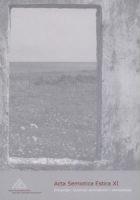Õppejõu professionaalne identiteet ülikooli institutsionaalse ideoloogia mõjuväljas
The professional identity of the lecturer in the field of influence of the university’s institutional ideology
Author(s): Anu SarvSubject(s): Sociology, Culture and social structure , Sociology of Education
Published by: Eesti Semiootika Selts
Keywords: professional identity; role expectations; discursive ideology;
Summary/Abstract: Professional formation is influenced by an ensemble of factors of which one of the most important is the working environment. Since at the core of professional self-definition stands the understanding of the self as an executor of a role, then also the perception of the expectations of the work environment attributed to the role and their accordance with self-perception influence greatly the formation of professional identity. To take under consideration the formation of the professional identity of the lecturer, it is important to take account of the common meanings and values shared in the university, especially from the point of view of the lecturer’s work. The university with its ideology (norms and values that guide the university’s practices) forms the attitude towards the work of the lecturer; this in turn affects how the lecturer perceives his or her role and thus what influences the formation of the lecturer’s selfdefinition. Different studies on the academic habitus show that the ways in which individuals understand their role and identity in the academic world are affected by the local context, including the discursive ideology expressed by the local university (Harris 2005; Clegg 2008; Entwistle 2009). The present article examines, on the example of the University of Tartu, how the lecturers perceive the expectations set on their roles and in what measure they accord with the formal expectations and norms of the university; in addition, which is the ideology of the University of Tartu based on these norms and expectations. In order to achieve this, I analyzed the perceived expectations of the lecturers on their role and the documents and regulations in force in the University of Tartu that deal with the lecturers’ work, the demands and expectations set for it. These documents and regulations thus reflect also the ideology of the university as an institution regarding the work of the lecturer. As the result of the analysis it could be said there exists a remarkable discrepancy between how the lecturers perceive the expectations and how the formal expectations are regulated by the university.
Journal: Acta Semiotica Estica
- Issue Year: 2014
- Issue No: 11
- Page Range: 102-126
- Page Count: 25
- Language: Estonian

